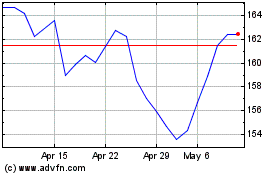By Mark Maurer
Airbus SE is using artificial intelligence to squeeze cost out
of its finance function, an experiment launched in the aircraft
maker's Americas division that could save the corporation millions
of dollars annually if rolled out in other regions.
It's one of the latest examples of how companies across sectors
are digitizing operations to increase efficiency, reduce human
error and free up employees for tasks that require more human
judgment, such as strategic planning, analysis and audits.
"Companies can now automate highly repetitive activity at a
lower cost with a higher degree of accuracy," said David Axson,
head of the CFO consulting practice at Accenture Strategy, a unit
of consulting firm Accenture PLC. "This especially applies to
high-volume-use cases like accounts payable."
Less than half of companies' accounts-payable activity worldwide
is currently automated, Accenture Strategy says. That figure is
expected to rise to 80% by 2025. Processing invoices and expense
reports are prime targets for automation.
And that's where Airbus is setting its sights. Less than two
years ago, four Airbus Americas Inc. employees would review about
25,000 travel-and-expense reports filed annually by employees in
Texas, Virginia, Florida and Mexico, according to Richard Masci,
the head of financial system services and compliance at Airbus
Americas.
Manually combing through every line of a single expense report
could take about an hour -- more, if the receipt was in a language
foreign to the reviewer. More still if there were red flags, such
as missing receipts.
Sometimes reviewers took shortcuts, such as going on trust and
approving an expense associated with a foreign receipt they
couldn't understand, to get through a pile of reviews. That could
lead to errors, Mr. Masci said. "Shortcuts for compliance purposes
are not the best," he said.
Last year, Mr. Masci oversaw the transition to a review system
that utilizes AI to review expense reports. Airbus turned to AppZen
Inc., a San Jose, Calif.-based software company, for the new
technology.
The system developed by AppZen matches reports against a
repository of accepted vendors, expense types and amounts to spot
anomalies. The technology examines items such as the identity of a
vendor, the existence of venues such as a restaurant, the type of
expense and the amount. It checks for receipts and it can recognize
more than 100 languages.
Today, a human only needs to review details the system deems
noncompliant, typically one or two lines in a 30-line report, Mr.
Masci said. For example, Airbus employees aren't permitted to
expense alcohol on business trips if it's not part of a meal. The
AI approval system might flag when an employee files a dinner
expense from a bar that doesn't serve food, something a human might
not always catch.
If the report passes muster, it is automatically validated and
payment can be initiated. The system flags noncompliant entries in
a report as low, medium or high risk. Nearly half of all expense
reports are deemed noncompliant, Mr. Masci said. High-risk reports
are blocked from payment. A travel-and-expense analyst will then
review those lines and contact the employee with questions. The
employee either resubmits with the missing information or, if
noncompliant, removes the line and resubmits.
The average time between submission to approval has gone from a
couple weeks to a few days, and the workload for human reviewers
has been cut by more than half, Mr. Masci said. Over time, the
system will detect patterns to process information faster and more
accurately.
The new process was deployed first in the Herndon, Va.,
headquarters of Airbus Americas. It has since been rolled out in
most of the division's other offices in North America.
In 2018, the first partial year of the technology's
implementation in the Americas division, Airbus paid off its
initial investment of $50,000 and pocketed about $50,000 more, Mr.
Masci said. The division expects to save $100,000 this year and at
least $200,000 in 2020 in the Americas. The savings come from the
reduction of required worker hours and the increase in rejected
expense payments. Mr. Masci predicts a stricter approval system
will ultimately make employees more disciplined about how they file
expenses, reducing the number of questionable expenses.
If Airbus opts to roll out the AI platform worldwide, "we are
talking several millions [of dollars] in savings," Mr. Masci said.
The European division, which is based in Leiden, Netherlands,
processes closer to 500,000 expense reports each year, he said.
The initiative comes on the heels of a similar project intended
to digitize invoice approvals. The company used scanning technology
to automate a manual system that often required employees to work
overtime to chase down missing information from invoices, a process
that Mr. Masci described as "extremely painful."
The success of the expense-approval project also could pave the
way for other digitization efforts outside of its finance function,
Mr. Masci said. Which is why the expense-approval process is so
important -- it helps the company grow accustomed to the
technology.
Airbus initially had to get comfortable with the idea that
humans aren't viewing every line of the invoices or expense reports
they're approving. But trust in the new system was quickly earned:
Mr. Masci said there has been a 70% reduction of human-introduced
errors. He's shooting for 90% in 2020.
The expense-report approval process in the Americas
headquarters, which is currently about 53% automated, is expected
to become up to 80% automated by the end of 2020. Mr. Masci doesn't
foresee a time when the processes will be entirely automated,
because there likely will remain a need for some human
communication.
The company also doesn't plan to lay off any of the Americas
workers previously tasked with the manual finance efforts, he said.
Many have been reassigned to take on auditing or other financial
work within the finance team, which expanded following Airbus' 2017
deal to take control of Bombardier Inc.'s CSeries jets, Mr. Masci
said.
"The AI is not here to lay off, but basically to reshuffle
activities," Mr. Masci said. "We're planning on reusing resources
in a smarter way."
Write to Mark Maurer at mark.maurer@wsj.com
(END) Dow Jones Newswires
August 19, 2019 05:44 ET (09:44 GMT)
Copyright (c) 2019 Dow Jones & Company, Inc.
Airbus (EU:AIR)
Historical Stock Chart
From Mar 2024 to Apr 2024

Airbus (EU:AIR)
Historical Stock Chart
From Apr 2023 to Apr 2024
